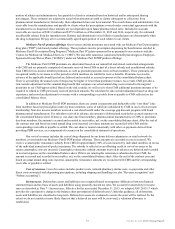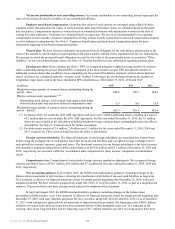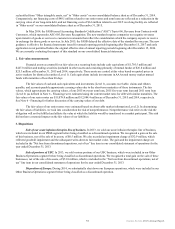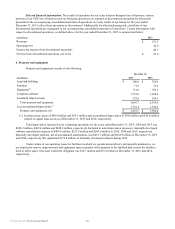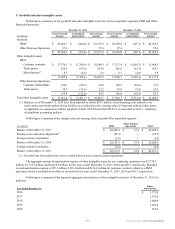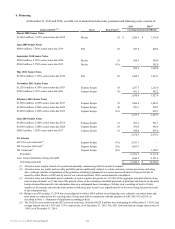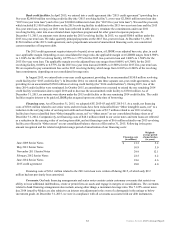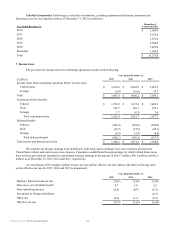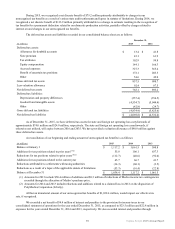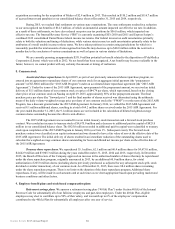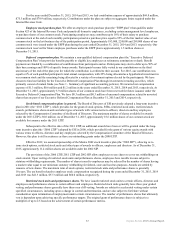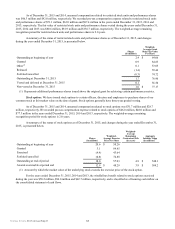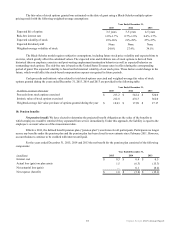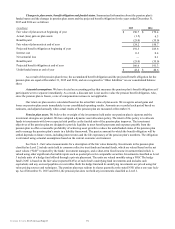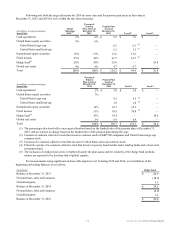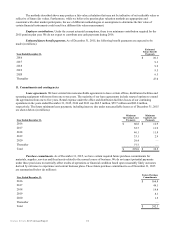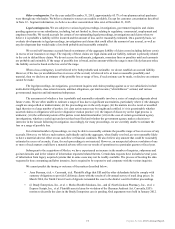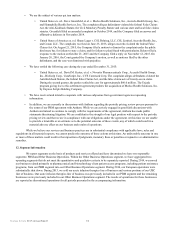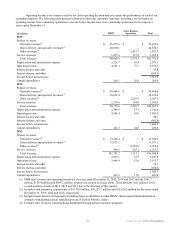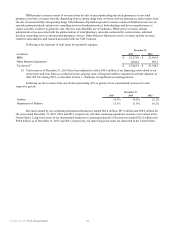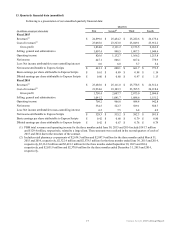Medco 2015 Annual Report Download - page 69
Download and view the complete annual report
Please find page 69 of the 2015 Medco annual report below. You can navigate through the pages in the report by either clicking on the pages listed below, or by using the keyword search tool below to find specific information within the annual report.67 Express Scripts 2015 Annual Report
For the years ended December 31, 2015, 2014 and 2013, we had contribution expense of approximately $69.8 million,
$75.3 million and $79.9 million, respectively. Contributions under the plan are subject to aggregate limits required under the
Internal Revenue Code.
Employee stock purchase plan. We offer an employee stock purchase plan (the “ESPP plan”) that qualifies under
Section 423 of the Internal Revenue Code and permits all domestic employees, excluding certain management level employees,
to purchase shares of our common stock. Participating employees may contribute up to 10% of their salary to purchase
common stock at the end of each monthly participation period at a purchase price equal to 95% of the fair market value of our
common stock on the last business day of the participation period. Approximately 183,000, 224,000 and 289,000 shares of our
common stock were issued under the ESPP plan during the years ended December 31, 2015, 2014 and 2013, respectively. Our
common stock reserved for future employee purchases under the ESPP plan is approximately 1.5 million shares at
December 31, 2015.
Deferred compensation plan. We maintain a non-qualified deferred compensation plan (the “Executive Deferred
Compensation Plan”) that provides benefits payable to eligible key employees at retirement, termination or death. Benefit
payments are funded by a combination of contributions from participants and us. Participants may elect to defer up to 50% of
their base earnings and 100% of specific bonus awards. Participants become fully vested in our contributions on the third
anniversary of the end of the plan year for which the contribution is credited to their account. For 2015, our contribution was
equal to 6% of each qualified participant’s total annual compensation, with 25% being allocated as a hypothetical investment in
our common stock and the remaining being allocated to a variety of investment options elected by the participants. We have
chosen to fund our liability for the Executive Deferred Compensation Plan through investments in trading securities, which
primarily consist of mutual funds (see Note 1 - Summary of significant accounting policies). We incurred net compensation
expense of $1.3 million, $0.6 million and $1.2 million in the years ended December 31, 2015, 2014 and 2013, respectively. At
December 31, 2015, approximately 5.9 million shares of our common stock have been reserved for future issuance under the
Executive Deferred Compensation Plan. We have $0.3 million and $0.3 million of unearned compensation related to unvested
shares that are part of our Executive Deferred Compensation Plan at December 31, 2015 and 2014, respectively.
Stock-based compensation plans in general. The Board of Directors of ESI previously adopted a long-term incentive
plan in 2011 (the “2011 LTIP”), which provides for the grant of stock options, SSRs, restricted stock units, restricted stock
awards, performance share awards and other types of awards with various terms to officers, directors and key employees
selected by the Compensation Committee of the Board of Directors. The maximum number of shares available for awards
under the 2011 LTIP is 30.0 million. As of December 31, 2015, approximately 18.6 million shares of our common stock are
available for issuance under the 2011 LTIP.
Subsequent to the effective date of the 2011 LTIP, no additional awards have been or will be granted under the long-
term incentive plan (the “2000 LTIP”) adopted by ESI in 2000, which provided for the grant of various equity awards with
various terms to officers, directors and key employees selected by the Compensation Committee of the Board of Directors.
However, this plan is still in existence as there are outstanding grants under the 2000 LTIP.
Effective 2012, we assumed sponsorship of the Medco 2002 stock incentive plan (the “2002 SIP”), allowing us to
issue stock options, restricted stock units and other types of awards to officers, employees and directors. As of December 31,
2015, approximately 11.4 million shares are available under the 2002 SIP.
The provisions of the 2000 LTIP, 2011 LTIP and 2002 SIP allow employees to use shares to cover tax withholdings on
stock awards. Upon vesting of restricted stock units and performance shares, employees have taxable income subject to
statutory withholding requirements. The number of shares issued to employees may be reduced by the number of shares having
a market value equal to our minimum statutory withholding for federal, state and local tax purposes. Awards are settled by
issuance of new shares. The maximum term of stock options, restricted stock units and performance shares is generally
10 years. The tax benefit related to employee stock compensation recognized during the years ended December 31, 2015, 2014
and 2013 was $41.3 million, $37.3 million and $60.0 million, respectively.
Restricted stock units and performance shares. We have issued restricted stock units to certain officers, directors and
employees and performance shares to certain officers and employees. Restricted stock units generally have three-year graded
vesting and performance shares generally have three-year cliff vesting. Awards are subject to accelerated vesting under certain
specified circumstances, including upon a change in control and termination, and are also subject to forfeiture without
consideration upon termination of employment under certain circumstances. The number of performance shares that ultimately
vest is dependent upon achieving specific performance targets. The original grant of performance shares is subject to a
multiplier of up to 2.5 based on the achievement of certain performance metrics.


